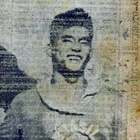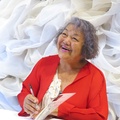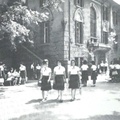A surprising connection from before the war
Research revealed that Padilha had indeed been working at the Sports Bureau since before the war. He was highly trusted by Adhemar Barros, who was appointed Consul General of São Paulo State (1938-41) by the Vargas dictatorship, and he began construction of the Baby Baglioni Sports Complex in the Agua Branca district of São Paulo, and the Ibirapuera Sports Complex Constantino Vaz Guimarães.
The former is still used as the venue for the All-Brazil Sumo Tournament, and the latter is home to a large judo hall known as the "Kodokan of South America." They also created facilities with deep ties to Japanese sports.
According to the online edition of the March 24, 2015 special "Olympics B-Side" on the ESPN website, Padilha created a state ordinance to guarantee the treatment of sports professionals such as physical education teachers. Vargas, who had noticed his work, ordered Padilha to make arrangements to apply the law to the entire country, but he refused. There must have been almost no one who rebelled against Vargas during his dictatorship.
Enraged, Vargas demoted Padilha to Passo Fundo, a remote area of Rio. At the time, the area had no electricity. Padilha consulted with Duttra, the Minister of Military Affairs, who he knew, and asked him to arrest him for insubordination, saying, "I cannot follow the President's orders." Duttra tried to settle the matter peacefully by giving him a year of unpaid service, but Padilha later resigned from the army.
As an athlete, his last hope for a medal was the Tokyo Olympics scheduled for 1940. Of course, it was canceled due to the outbreak of World War II. It was invited as part of the 2,600th anniversary of the founding of the Imperial Japanese Army and decided to host it in 1936. However, with the outbreak of the Sino-Japanese War, the Japanese government gave up the "phantom Olympics."
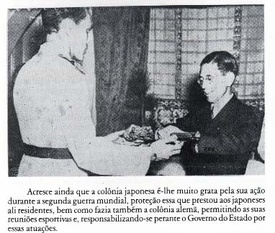
An unexpected anecdote is written on pages 35-36 of " Padelha, quase uma lenda " ("Padelha, Almost a Legend," by Caetano Carlos Paioli, 1987): "The most exciting honor Padilha received in his life was the samurai sword he received from the Japanese colony on March 20, 1941."
Moreover, it was apparently presented to him by Kiyoshi Yamamoto, who was the honorary president of the Colonia Athletics Club (Club Stletico Colonial). Padilha, who was already the Director of Sports of the State of São Paulo, was invited to Yamamoto's home, where he found a lineup of Colonia's leading figures and Brazilian athletes.
He was honored for his generous support for the Colonia athletes who were traveling to Japan for the sports event held in the previous year, the 2600th year of the Imperial Era (1940). He may have entrusted his hopes for "Tokyo" that he himself was unable to go to. Even so, the breadth of Yamamoto Takayoshi's personal network, which led to him founding the São Paulo City Cultural Association after the war and becoming its first chairman, is astonishing.
In this context, it seems that an unusual permission was eventually given to swim in the "Japanese Pool" in Marilia, where Okamoto began swimming, even though it had been temporarily banned during the war due to incomplete paperwork.
Anti-Vargas Flying Fish Invitation
During the war, Padilha's career as an athlete peaked, and he retired in 1947. At the same time, he was appointed as a member of the Brazilian Olympic Committee, in recognition of his ability to promote sports. He participated as the flag bearer for the Brazilian national team at the London Olympics in 1948. In a sense, this was when he really showed his talent.
The feud with Vargas continued after the war. Vargas was elected again as president in January 1951. His predecessor, President Dutra (PSD, 1946-January 1951), had been the Minister of Military Affairs during the Vargas dictatorship, and had inherited the basic system from the Vargas era. The PSD and PTB formed a political alliance called "Pro Jeturista," and together with the opposing UDN, they became the two major powers after the war.
Meanwhile, Adhemar Barros joined the UDN and broke with Vargas in the November 1945 presidential election, instead supporting Dutra's rival, Eduardo Gómez.
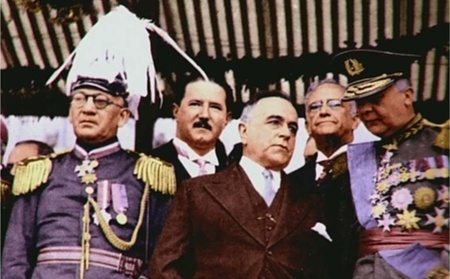
This was the beginning of Padilha's career as a key figure in the anti-Vargas camp.
Barros was elected Governor of the state of São Paulo and served in that position from March 1947 to January 1951. At this time, Padilha was again invited to become Director of Athletics of the state of São Paulo.
In this context, he came up with a plan to promote sports in a way that Vargas would have disliked: inviting Japanese athletes, who had been enemies of the Allied Powers during the war, to participate in the Brazilian Championships. Vargas had a strong influence on the Dutra administration, and he forcefully rejected his request and invited the Japanese swimming team to participate in 1950.
According to the ESPN website's "Olympics B-Side" special feature, March 24, 2015, the online edition reads, "The feud with Vargas continues. Silvio (Padilha), the Sports Director of the State of Sao Paulo, invited the world's fastest flying fish to perform a demonstration event in the state of Sao Paulo. They were a Japanese team, and since the results of the war meant that Japan had no diplomatic relations with the world, it was generally thought that they should not be invited. Vargas wanted to stop the idea. But Padilha rejected it, saying, "This is a state issue, not something to do with the federation. They are not a political delegation, they are athletes." After the group arrived, the president requested that the Japanese flag and the singing of the national anthem be banned, but Silvio further rejected it, saying it was only natural since it was an event to honor the Japanese people. In Marilia, one of the places they visited, Tetsuo Okamoto learned their methods and became the first medalist in this sport in the Brazilian Olympic world."
In other words, as an anti-Vargasist measure to promote sports, the Japanese swimming team was invited with money from the São Paulo state government, and they were boldly made to raise the Hinomaru flag and sing the national anthem in front of the large group of Japanese immigrants gathered there.
For Japanese immigrants who had been persecuted as enemy nationals by the Vargas dictatorship before and during the war, this was a dreamlike scene.
Padilha became a member of the Brazilian Olympic Committee in 1947 and, coincidentally, became its chairman at the time of the 1964 Tokyo Olympics. Since then, he became a major figure, leading the Brazilian delegation to seven Olympic Games up to the 1988 Seoul Olympics.
Under an administration heavily influenced by Vargas, it would have been unthinkable for anyone other than a man with such a rebellious spirit to foot the bill and invite a Japanese swimming team to the country.
But his wish was heard, and Okamoto finally stood on the podium in Helsinki in 1952. This may have been a revenge for the people of Sao Paulo who had been trampled by the federal army during the Constitutional Revolution. The person who was most pleased with Okamoto's achievement must have been Padilha.
*This article is reprinted from the Nikkei Shimbun ( August 18th and 19th , 2016).
© 2016 Masayuki Fukasawa, Nikkey Shimbun


